- Home
- Warhammer 40K
Defenders of Mankind - David Annandale & Guy Haley
Defenders of Mankind - David Annandale & Guy Haley Read online
Table of Contents
Cover
Table of Contents
Title Page
Warhammer 40,000
The Death of Antagonis – David Annandale
Chapter 1
Chapter 2
Chapter 3
Chapter 4
Chapter 5
Chapter 6
Chapter 7
Chapter 8
Chapter 9
Chapter 10
Chapter 11
Chapter 12
Chapter 13
Chapter 14
Chapter 15
Chapter 16
Chapter 17
Chapter 18
Chapter 19
Chapter 20
Chapter 21
Chapter 22
Chapter 23
Chapter 24
Chapter 25
Chapter 26
Chapter 27
Chapter 28
Epilogue
The Tribute of Flesh – David Annandale
The Rite of Holos – Guy Haley
Death of Integrity – Guy Haley
Chapter 1
Chapter 2
Chapter 3
Chapter 4
Chapter 5
Chapter 6
Chapter 7
Chapter 8
Chapter 9
Chapter 10
Chapter 11
Chapter 12
Chapter 13
Chapter 14
Chapter 15
Chapter 16
Chapter 17
Chapter 18
Chapter 19
Chapter 20
Chapter 21
Chapter 22
Chapter 23
Epilogue
Final Journey – Guy Haley
Blood Calm – Guy Haley
About the Authors
Legal
It is the 41st millennium. For more than a hundred centuries the Emperor has sat immobile on the Golden Throne of Earth. He is the master of mankind by the will of the gods, and master of a million worlds by the might of his inexhaustible armies. He is a rotting carcass writhing invisibly with power from the Dark Age of Technology. He is the Carrion Lord of the Imperium for whom a thousand souls are sacrificed every day, so that he may never truly die.
Yet even in his deathless state, the Emperor continues his eternal vigilance. Mighty battlefleets cross the daemon-infested miasma of the warp, the only route between distant stars, their way lit by the Astronomican, the psychic manifestation of the Emperor’s will. Vast armies give battle in his name on uncounted worlds. Greatest amongst His soldiers are the Adeptus Astartes, the Space Marines, bio-engineered super-warriors. Their comrades in arms are legion: the Astra Militarum and countless planetary defence forces, the ever-vigilant Inquisition and the tech-priests of the Adeptus Mechanicus to name only a few. But for all their multitudes, they are barely enough to hold off the ever-present threat from aliens, heretics, mutants – and worse.
To be a man in such times is to be one amongst untold billions. It is to live in the cruellest and most bloody regime imaginable. These are the tales of those times. Forget the power of technology and science, for so much has been forgotten, never to be re-learned. Forget the promise of progress and understanding, for in the grim dark future there is only war. There is no peace amongst the stars, only an eternity of carnage and slaughter, and the laughter of thirsting gods.
CHAPTER 1
THE DUTY TO PROTECT
The Wars of Lamentation did not come to Elias Tennesyn in the person of the Dragon or the Gorgon. Those figures would come later. Visited upon him by the Wars, they would, for his sins, drag him through the hellscape of what had once been his life’s work. But if they were the avatars of war, they were not its herald. That role (and oh, by the Throne, had Tennesyn only known it) fell to a man whose smile told a tale of a soul eternally surprised by joy.
The herald was called Cardinal Rodrigo Nessun. Though he wore a gold medallion in the shape of a wide, almost circular eye suspended over the hilt of a sword, his robes had none of the adornment Tennesyn would have expected of a senior ecclesiarch. Instead, they were a blinding, quasar white, and their every fold winked, their every billow laughed. The movements of the clothing were the reflections of the man’s pale blue eyes, eyes whose sparkle was a flourish of delight in the universe. His hair was as white as his robes. There were moments when Tennesyn couldn’t distinguish one from the other, as if the hair that fell in a thick cascade down Nessun’s back spread and shaped itself into vestments. The cardinal’s skin was white too, a beyond-albino chalk. He could have been a ghost, and he did, it was true, seem to walk a few centimetres off the ground. He could have been a ghost, but he was much too happy.
And on the day the Wars of Lamentation began in the Phlagia system, on the planet Antagonis, Nessun wasn’t just floating. He was dancing . Tennesyn’s mood was darker. The xeno-archaeologist was happy that his sponsor was pleased. But now, on the very day that the dig site seemed bound to validate his theories, Tennesyn was having to rush off back to Aighe Mortis in the neighbouring Camargus system. Another of his best researchers was being conscripted into the Imperial Guard. It was the third time in a week. Tennesyn had no quarrel with duty to the Emperor, but there were different ways to serve, and how was he supposed to do any work of real value if his staff kept being poached by the Departmento Munitorum? If Tennesyn wanted to reach Aighe Mortis before his protégé was bundled off-world, no doubt to die fighting over a rise of rock that no one could possibly be interested in were it not for the other people who couldn’t possibly be interested in it, then he had to leave, and right away.
At this point, Tennesyn thought he knew the impact war would have on his life: problems with excessive staff turnover.
He had no idea how deep his naivete ran.
So on the day the Wars came to Antagonis (but not to Tennesyn yet, not just yet), Nessun asked, ‘The site is completely revealed now?’
‘It is.’
‘And the alignment is…?’
‘Tonight.’
The herald of war clapped his hands in excitement. Not at all seeing what waited in the wings, Tennesyn took his leave, and started down the road where the Dragon and the Gorgon waited.
In a week, a world can fall.
Volos jolted awake. He sat up. His feet sought the reassuring reality of the Immolation Maw’ s deck. His hands squeezed the iron frame of the cot as he fought to steady the vertigo of his spirit. Volos did not dream, nor had he now. No images engaged in a fading dance through his mind. Yet his heart was sick with the perfect, absolute, unalterable knowledge that his hands would soon carry stains from an ocean of innocent blood.
Melus whistled, his helmet speaker distorting the sound into a high-pitched whine.
‘If you don’t mind, brother,’ Toharan said.
‘Apologies, brother-sergeant. I was just thinking…’
‘The same thing I am,’ Toharan finished.
They were standing in the doorway to the huge, shallow bowl of the refuge. The space was spare and unadorned, a coldly functional, open-plan bunker. There were at least a thousand people staring back at them with a mixture of fear and hope.
The orders had been to sweep the capital city for survivors. More specifically: hit the palace of Benedict Danton, high lord of Antagonis, and rescue what portion of the planet’s government might yet draw breath. If there were any encounters of opportunity along the way, lend help and gather civilians where possible, but get Lord Danton and his family out of there. Squad Pythios of the Black Dragons Second Company had gone in, wo
rking with the Fourth and 25th Companies of the Imperial Guard’s Mortisian Regiment. And here, in the sealed basement of the palace, hiding from the walking corpses that, as far as Toharan could tell, comprised the rest of the city of Lecorb’s population of twelve million, was everyone they could reasonably expect to find. And more. Toharan ran his eyes again over the huddled figures. His first estimate had been correct: a good thousand souls.
‘Too many for an airlift,’ Melus said.
‘Yes,’ Toharan agreed. ‘We’re walking out of here.’ He wasn’t worried. Between his squad and the thirty thousand Mortisians, there was more than enough force on hand to act as escort, especially given how non-aggressive the dead were. They had completely ignored the Dragons and the Guard on the way in, even though their behaviour was otherwise more frenzied than Toharan had seen before. The corpses ran, howled, tore at themselves and each other, clawed at walls, and beat their own heads to pulp. But they did not attack.
A man stepped forward from the crowd and approached the two Space Marines. Toharan pegged him as being in his early sixties, standard. His lined, patrician face showed no signs of augmetic or juvenat treatment, which was unusual. His suit was elegantly austere, a simple black adorned by the vermilion sash of his office. There was a child, a girl of about ten, peering out from behind his legs. He had a protective hand on her plaited hair. ‘I am Lord Danton,’ the man said. ‘And this is Bethshea. I’ve been trying to tell her that you have come to help us.’
Toharan turned his gaze to the girl. ‘That’s right. We have.’
Bethshea did not look reassured. She shrank further behind Danton.
‘She thinks you’re monsters,’ Danton explained.
Really? Toharan thought. The Black Dragons? Monsters? Towering head and shoulders over every human in the room, clad in black power armour emblazoned with a silver dragon, armour whose snarling helmet grilles were designed to strike fear into the enemy – why in Terra’s name would they seem like monsters to a little girl?
‘Don’t be afraid, child,’ Melus said, and started to unclasp his helmet.
Toharan raised a hand to stop him. ‘Allow me, brother.’ No point traumatising the child any further. He removed his own helmet and let Bethshea see his very human, if outsized, face. She appeared to relax. Slightly.
‘Well done,’ Melus said over the vox-link when Toharan had replaced his helmet. ‘My face would not have helped.’
‘That was my thought.’
‘Could be worse. I could be Volos.’
Toharan chuckled, then switched to his speaker. ‘People of Lecorb,’ he announced, ‘we have come to lead you to safety.’
Squad Pythios brought the survivors out of the bunker. They mustered in the square of the palace compound, then joined the waiting ranks of the Mortisians. The convoy moved out from the palace walls, out onto Admiral Kiershing Square, with the Space Marines taking point.
And the dead attacked.
The change was instantaneous. The random wandering, despairing moans and acts of self-destruction turned into a furious charge. Five great avenues fed into the square, and from all of them came a storm surge of bodies. The dead ignored the Space Marines and slammed into the Guard. The Mortisians were fast. A wall of stubber and las-fire met the onrushing dead, but the momentum of tens of thousands of bodies wasn’t going to be halted. Five collective battering rams struck, and the Imperial lines buckled. Toharan turned, and saw the impossible. Already, within the first second of the battle, as the Mortisians found themselves in full melee, men were changing, their eyes blanking into mindless hunger and rage as they fell on their comrades.
‘Diamond,’ Toharan voxed. ‘Out then in.’ Squad Pythios plunged into the fight. They scythed through the dead with chainblade and fist, decapitating and crushing. It was like wading through molasses. The dead were so focused on clawing past the Mortisians to the civilians that they barely reacted to the Dragons advance.
Toharan forced a reaction. He and his brothers became the moving rocks against which the death tide broke. They split into two groups and worked their way around the defensive island of the Guard. They slashed across the flow of the dead, hundreds falling before them like threshed wheat. Halfway around the Mortisians’ perimeter, the Dragons split again, with one half of the squad moving to the rear lines, and the other heading to the front, tearing apart another rank of the enemy. The momentum of the dead stalled. There was a pause while the flood of reinforcements continued to pour in from the avenues, and the charge built up its strength again.
The Mortisians had the measure of their opponents now, though Toharan already had his doubts about what difference that would make in the long run. The reality of twelve million damned souls was sinking in. But for now, the massed power of the Imperial Guard unleashed a horizontal rain of projectile and las-fire. The barrage was continuous, and it pushed back the army of the dead before it could surge again.
Breathing space. Time to move.
‘Go!’ Toharan shouted over vox-link and speaker, and the caravan took its first, lurching steps. The Dragons moved to the interior perimeter. Toharan disliked not being on the front lines, but he had his orders, and the mission dictated strategy. It was not the Dragons’ remit to take on an entire city. Their battle, in this moment, was to save as many civilians as possible. The people would be needed after the next stage of the war, after the Black Dragons and the other vectors of Imperial might had purged Antagonis of its taint. There had to be a population to reclaim the planet, to celebrate the victory and prove that it was not pyrrhic. So Squad Pythios moved to protect the unarmed. As big as the area was that the thousand civilians took up, it was one whose bounds the Dragons could keep patrolled. The refugees marched, and the Space Marines circled them at a constant run, bringing bolter and chainblade to bear wherever the Mortisian defences needed shoring up.
Toharan paused in his run to jump up on the lead vehicle, a Hellhound. Colonel Burston Kervold, heading the joint command of the Fourth and 25th companies, rode standing in the roof hatch, magnoculars around his neck. His chin was a steel prosthetic. It was scratched and pitted as if he really did lead with it. Kervold’s cap perched on a head that was a phrenological map of his tours of duty. His eyes were narrowed flints, staring at the dead with a contempt so strong it should have blasted a path clear to the outskirts of the city. But when Kervold turned his head to face Toharan, the Space Marine thought he saw the tightness of fatalism in the officer’s gaze. Kervold had seen and noted the same things, then. The behaviour of the dead was unusual, unlike any plague of undeath Toharan had fought before. Even more than the speed of the dead, it was their focus that was alarming. There wasn’t just hunger in their frenzy. There was anger. There was passion. And then there was the rapidity of the contagion.
The elements were all wrong. Vital information was missing. The mission had the earmarks of a disaster.
‘If we stop,’ Kervold yelled over the roar of the inferno cannon’s spray of ignited promethium, ‘we’ll be finished.’ Ahead of them, the dead looked like a solid mass.
‘Then we don’t stop,’ Toharan replied. ‘Not for any reason. How is our route?’
‘We’ll stick to the big avenues for as long as we can. But once we’re into the hab zones…’ Kervold’s shrug was humorous in its understatement of despair.
Toharan nodded. ‘Then we fight harder. And we still don’t stop.’ He dropped back to the ground and resumed destroying. Already the defences were being strained again. Already Guard lines were thinning.
Kervold was right. The hab zones were worse.
As long as the caravan was in the administrative centre of Lecorb, on streets five hundred metres wide, the defenders held their own. Flame, faith and will kept them moving forward. Wheels, treads and boots crunched over the flattened and burned bodies of the twice-killed. Though the dead massed in the tens of thousands in the open spaces, there were only so many that could attack at once.
The hab zones were another s
tory. The streets were narrow and none carried on straight for more than a few blocks. Lecorb’s history was preserved in its patchwork layout. Fragments of districts layered each other, the new never completely replacing the old, as if pieces from a random collection of jigsaw puzzles had been forced together, whether they fit or not. It was impossible to see what was coming. Each sharp corner slowed the caravan down, giving the dead, now a wall of meat in the confined corridors, longer and longer to press their attacks.
Bad as the streets were, the real nightmare was the architecture. Lecorb’s growth had been haphazard, its one burst of urban planning happening in M38, when Lord Hosman had ordered the centre of the city razed to make way for the new administrative complexes. Its style of construction, however, had remained unchanged since the Great Crusade. At some point, the tradition of using pilotis and open facades had become linked, in the cultural imagination, with the act of obeisance to the Emperor. Load-bearing walls had become heretical. But the preservation of any particular structure was unimportant. As a result, apartment had been built atop apartment, new growths of pillars sprouting out of decaying roof gardens to support a new building, whose roof would in turn birth another.
Some buildings overlapped the roofs of several smaller ones, and the facades, freed of the need to do something as mundane as hold the structures upright, had turned into a crazy quilt of murals, stained glass windows, or sullen, stained rockcrete. The zone was a lunatic collection of boxes on stilts that looked, at first glance, like a forest of spindle-legged Titans and Dreadnoughts in collision. Time, smog and decay had rotted the faces of the buildings, and what might once have looked festive, with strident colour offset by the sober grey of unadorned walls, was now a study in dour mud.
And from every one of the myriad openings came the dead. They were like insects streaming from the opened pores of a stricken giant. From all sides, from all floors, from directly above, they fell upon the caravan. Over the neural link, Toharan’s helmet transmitted threat detection so universal that he tuned it out. He simply struck at whatever was nearest, and he shattered bodies with every movement.
As the caravan dragged itself forward, the Dragons gave up their rotating patrol and each took ownership of a sector inside the Guard lines. The dead were a terrible hail coming down on top of the refugees, and the Space Marines had to move from the perimeter to the centre of the huddled survivors and back out again within seconds. It was like swatting individual insects in a swarm. They smashed many.

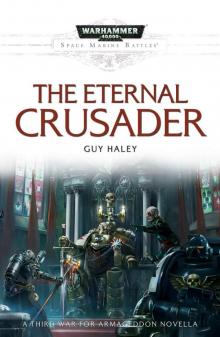 The Eternal Crusader - Guy Haley
The Eternal Crusader - Guy Haley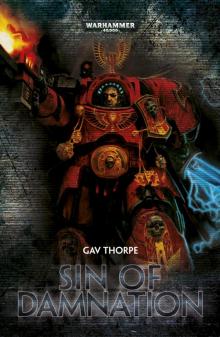 Sin of Damnation - Gav Thorpe
Sin of Damnation - Gav Thorpe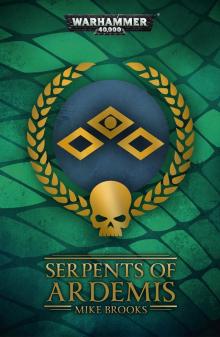 Serpents of Ardemis - Mike Brooks
Serpents of Ardemis - Mike Brooks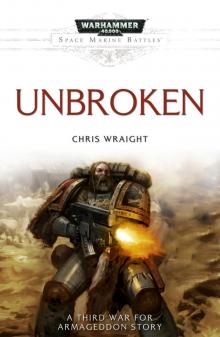 Unbroken - Chris Wraight
Unbroken - Chris Wraight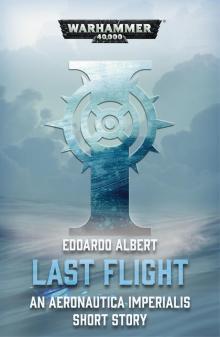 Last Flight - Edoardo Albert
Last Flight - Edoardo Albert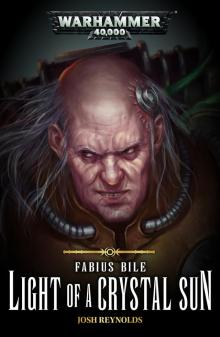 Light of a Crystal Sun - Josh Reynolds
Light of a Crystal Sun - Josh Reynolds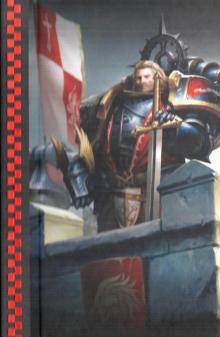 Lion El'Jonson- Lord of the First - David Guymer
Lion El'Jonson- Lord of the First - David Guymer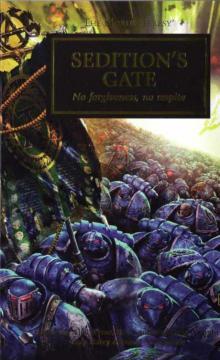 Sedition's Gate - Nick Kyme & Chris Wraight
Sedition's Gate - Nick Kyme & Chris Wraight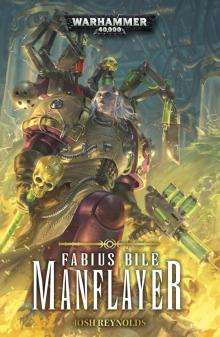 Manflayer - Josh Reynolds
Manflayer - Josh Reynolds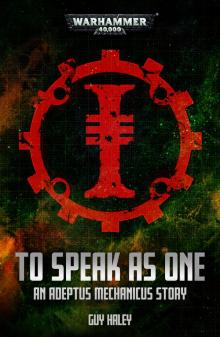 To Speak as One - Guy Haley
To Speak as One - Guy Haley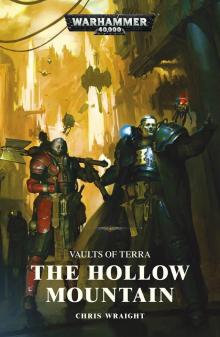 Vaults of Terra- The Hollow Mountain - Chris Wraight
Vaults of Terra- The Hollow Mountain - Chris Wraight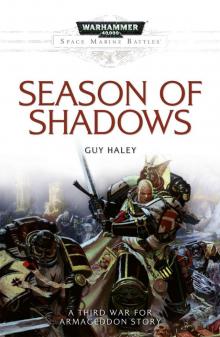 Season of Shadows - Guy Haley
Season of Shadows - Guy Haley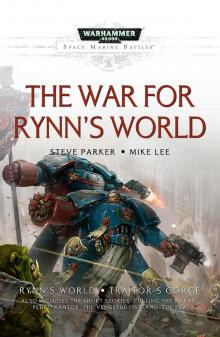 The War for Rynn's World - Steve Parker & Mike Lee
The War for Rynn's World - Steve Parker & Mike Lee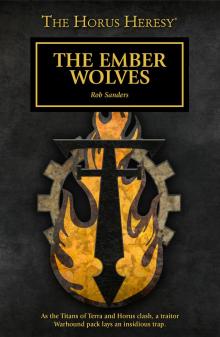 The Ember Wolves - Rob Sanders
The Ember Wolves - Rob Sanders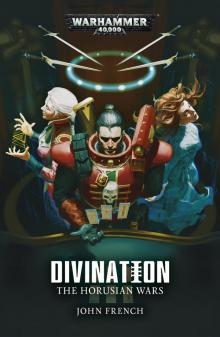 Divination - John French
Divination - John French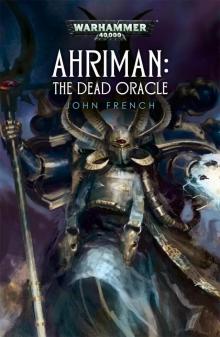 The Dead Oracle - John French
The Dead Oracle - John French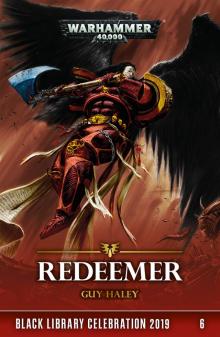 Redeemer - Guy Haley
Redeemer - Guy Haley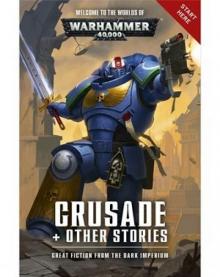 Crusade & Other Stories - Dan Abnett Et Al.
Crusade & Other Stories - Dan Abnett Et Al.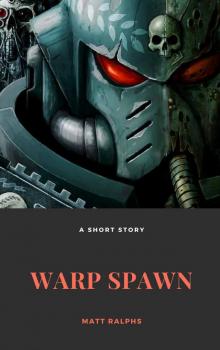 Warp Spawn - Matt Ralphs
Warp Spawn - Matt Ralphs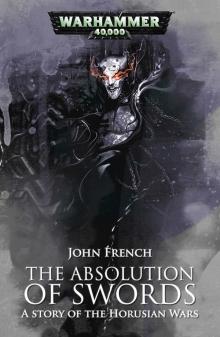 The Absolution of Swords - John French
The Absolution of Swords - John French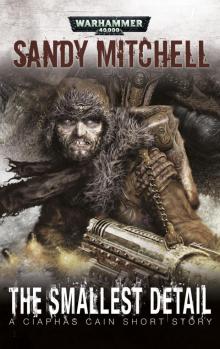 The Smallest Detail - Sandy Mitchell
The Smallest Detail - Sandy Mitchell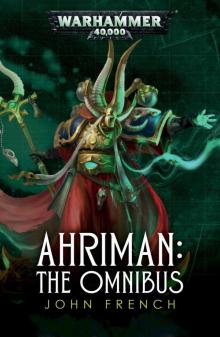 The Omnibus - John French
The Omnibus - John French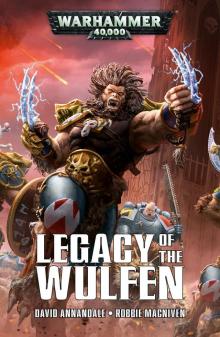 Legacy of the Wulfen - David Annandale & Robbie MacNiven
Legacy of the Wulfen - David Annandale & Robbie MacNiven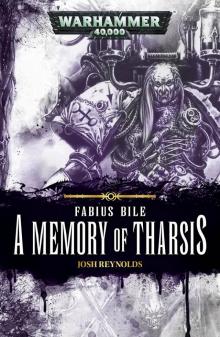 A Memory of Tharsis - Josh Reynolds
A Memory of Tharsis - Josh Reynolds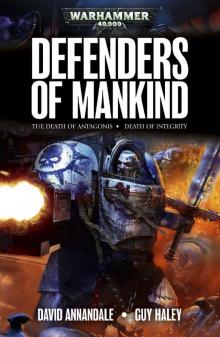 Defenders of Mankind - David Annandale & Guy Haley
Defenders of Mankind - David Annandale & Guy Haley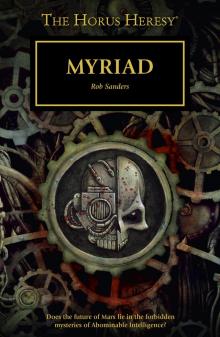 Myriad - Rob Sanders
Myriad - Rob Sanders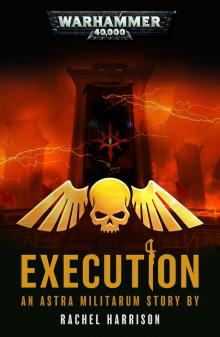 Execution - Rachel Harrison
Execution - Rachel Harrison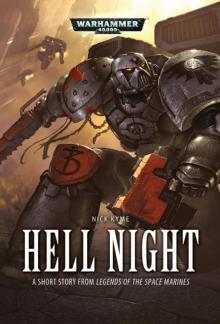 Hell Night - Nick Kyme
Hell Night - Nick Kyme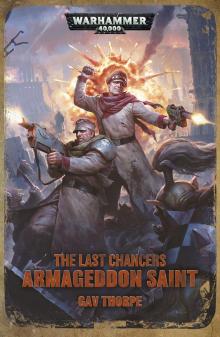 Armageddon Saint - Gav Thorpe
Armageddon Saint - Gav Thorpe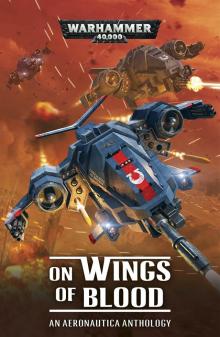 On Wings of Blood
On Wings of Blood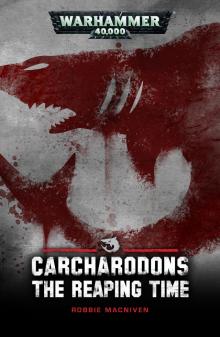 The Reaping Time - Robbie MacNiven
The Reaping Time - Robbie MacNiven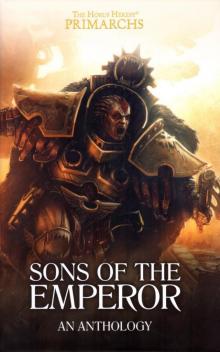 Sons of the Emperor
Sons of the Emperor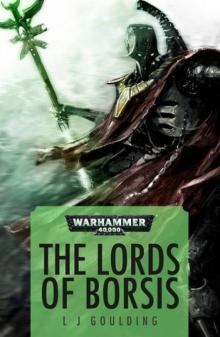 The Lords of Borsis - L J Goulding
The Lords of Borsis - L J Goulding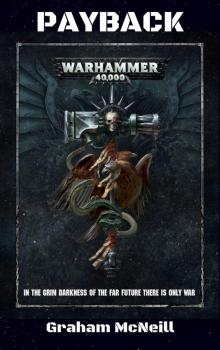 Payback - Graham McNeill
Payback - Graham McNeill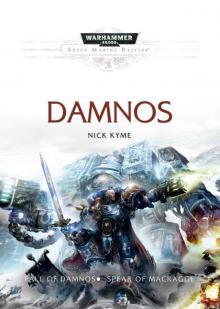 Damnos - Nick Kyme
Damnos - Nick Kyme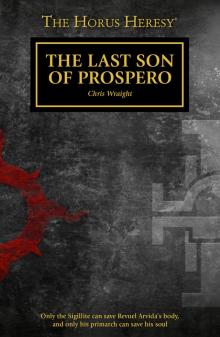 The Last Son of Prospero - Chris Wraight
The Last Son of Prospero - Chris Wraight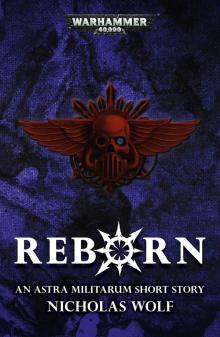 Reborn - Nicholas Wolf
Reborn - Nicholas Wolf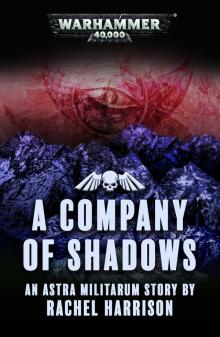 A Company of Shadows - Rachel Harrison
A Company of Shadows - Rachel Harrison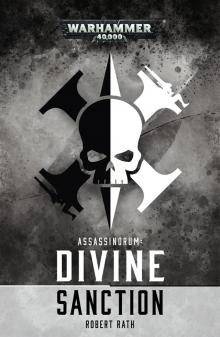 Assassinorum- Divine Sanction - Robert Rath
Assassinorum- Divine Sanction - Robert Rath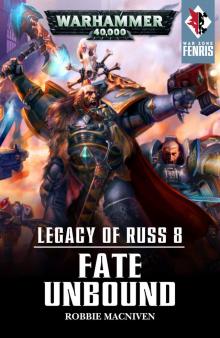 Fate Unbound - Robbie MacNiven
Fate Unbound - Robbie MacNiven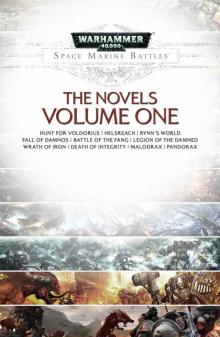 Space Marine Battles - the Novels Volume 1
Space Marine Battles - the Novels Volume 1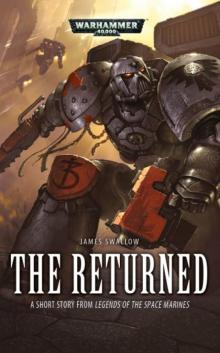 The Returned - James Swallow
The Returned - James Swallow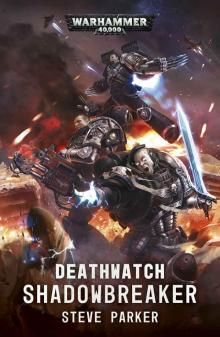 Shadowbreaker - Steve Parker
Shadowbreaker - Steve Parker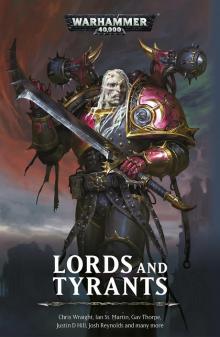 Lords and Tyrants
Lords and Tyrants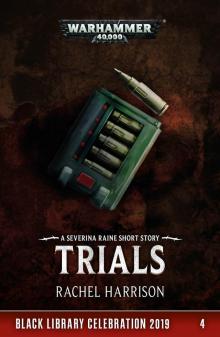 Trials - Rachel Harrison
Trials - Rachel Harrison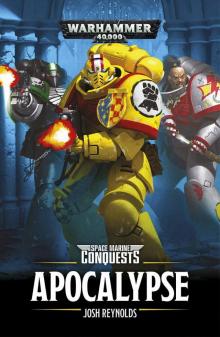 Apocalypse - Josh Reynolds
Apocalypse - Josh Reynolds The labyrinth - Richard Ford
The labyrinth - Richard Ford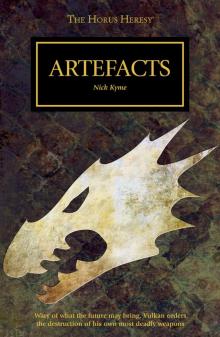 Artefacts - Nick Kyme
Artefacts - Nick Kyme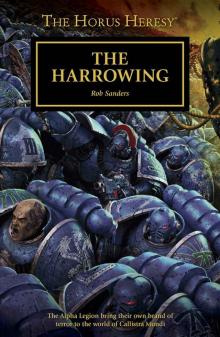 The Harrowing - Rob Sanders
The Harrowing - Rob Sanders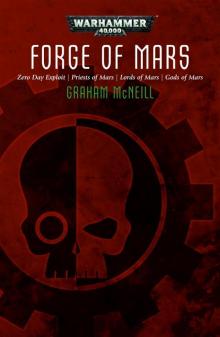 Forge of Mars - Graham McNeill
Forge of Mars - Graham McNeill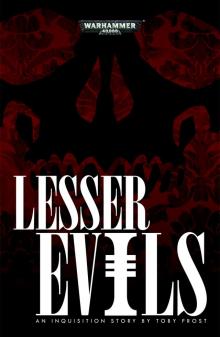 Lesser Evils - Toby Frost
Lesser Evils - Toby Frost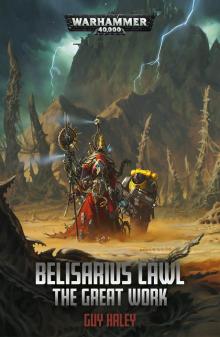 Belisarius Cawl- the Great Work - Guy Haley
Belisarius Cawl- the Great Work - Guy Haley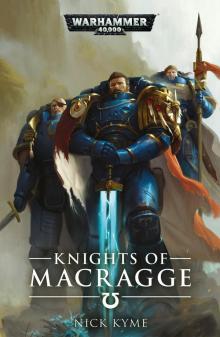 Knights of Macragge - Nick Kyme
Knights of Macragge - Nick Kyme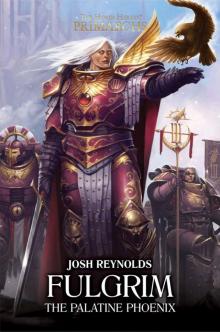 Fulgrim- The Palatine Phoenix - Josh Reynolds
Fulgrim- The Palatine Phoenix - Josh Reynolds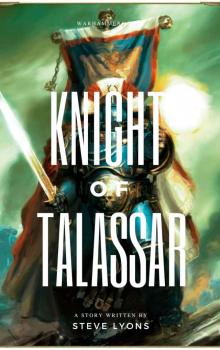 Knight of Talassar - Steve Lyons
Knight of Talassar - Steve Lyons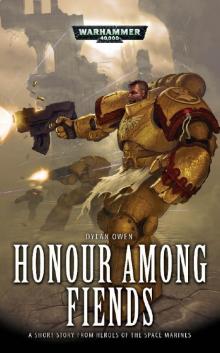 Honour Among Fiends - Dylan Owen
Honour Among Fiends - Dylan Owen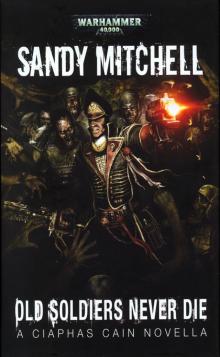 Old Soldiers Never Die - Sandy Mitchell
Old Soldiers Never Die - Sandy Mitchell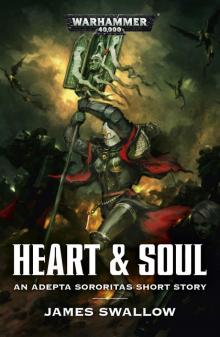 Heart & Soul - James Swallow
Heart & Soul - James Swallow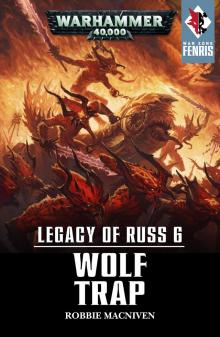 Wolf Trap - Robbie MacNiven
Wolf Trap - Robbie MacNiven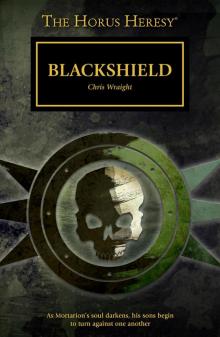 Blackshield - Chris Wraight
Blackshield - Chris Wraight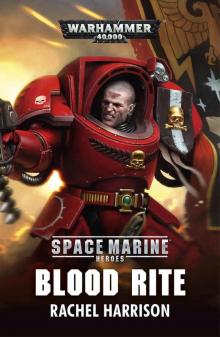 Blood Rite - Rachel Harrison
Blood Rite - Rachel Harrison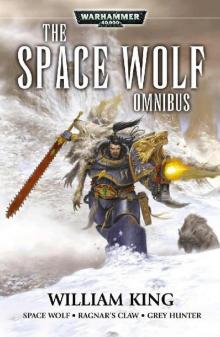 The Space Wolf Omnibus - William King
The Space Wolf Omnibus - William King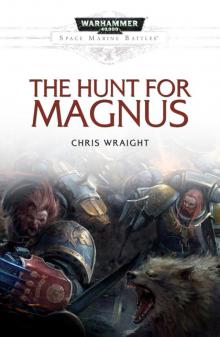 The Hunt for Magnus - Chris Wraight
The Hunt for Magnus - Chris Wraight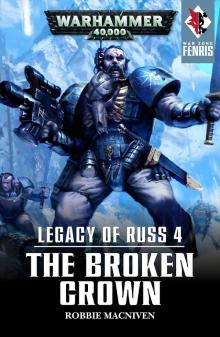 The Broken Crown - Robbie MacNiven
The Broken Crown - Robbie MacNiven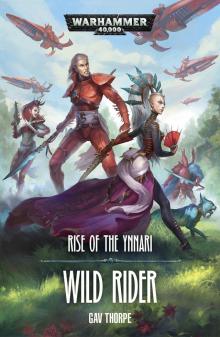 Wild Rider - Gav Thorpe
Wild Rider - Gav Thorpe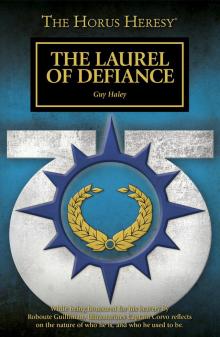 The Laurel of Defiance - Guy Haley
The Laurel of Defiance - Guy Haley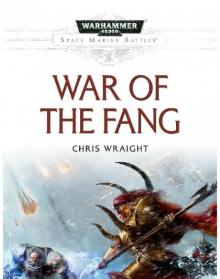 War of the Fang - Chris Wraight
War of the Fang - Chris Wraight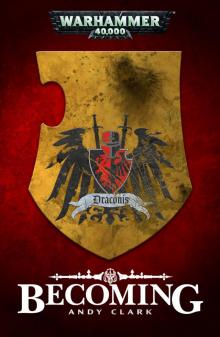 Becoming - Andy Clark
Becoming - Andy Clark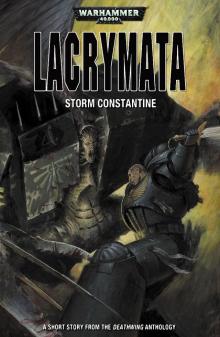 Lacrymata - Storm Constantine
Lacrymata - Storm Constantine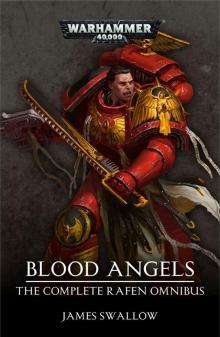 Blood Angels - The Complete Rafen Omnibus - James Swallow
Blood Angels - The Complete Rafen Omnibus - James Swallow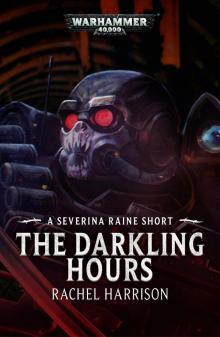 The Darkling Hours - Rachel Harrison
The Darkling Hours - Rachel Harrison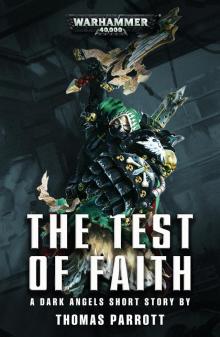 The Test of Faith - Thomas Parrott
The Test of Faith - Thomas Parrott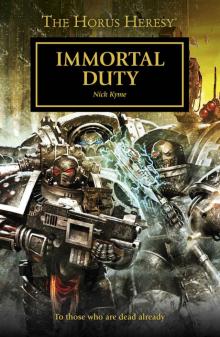 Immortal Duty - Nick Kyme
Immortal Duty - Nick Kyme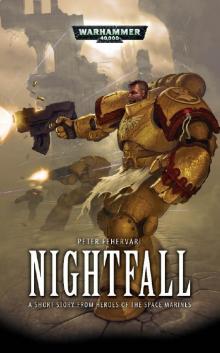 Nightfall - Peter Fehervari
Nightfall - Peter Fehervari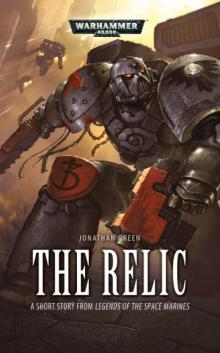 The Relic - Jonathan Green
The Relic - Jonathan Green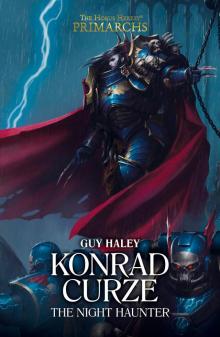 Konrad Curze the Night Haunter - Guy Haley
Konrad Curze the Night Haunter - Guy Haley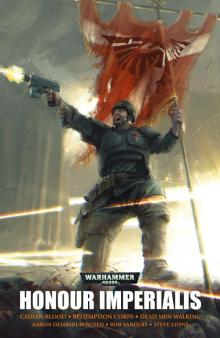 Honour Imperialis - Aaron Dembski-Bowden
Honour Imperialis - Aaron Dembski-Bowden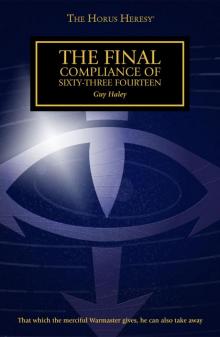 The Final Compliance of Sixty-Three Fourteen - Guy Haley
The Final Compliance of Sixty-Three Fourteen - Guy Haley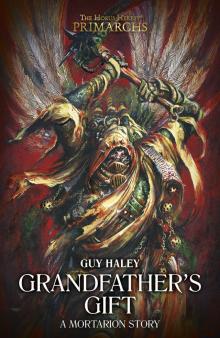 Grandfather’s Gift - Guy Haley
Grandfather’s Gift - Guy Haley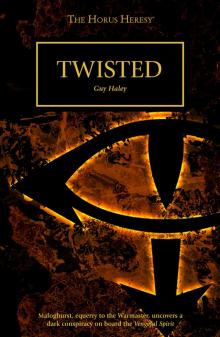 Twisted - Guy Haley
Twisted - Guy Haley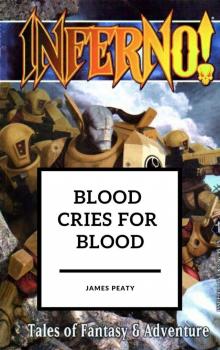 Blood Cries for Blood - James Peaty
Blood Cries for Blood - James Peaty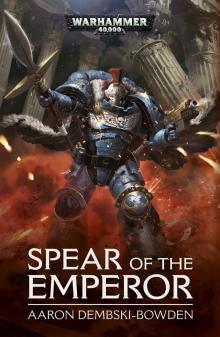 Spear of the Emperor - Aaron Dembski-Bowden
Spear of the Emperor - Aaron Dembski-Bowden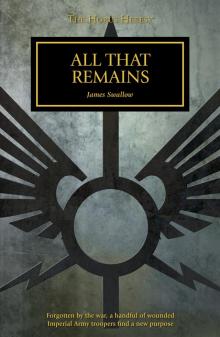 All That Remains - James Swallow
All That Remains - James Swallow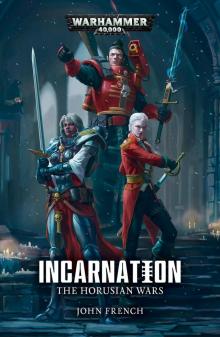 Incarnation - John French
Incarnation - John French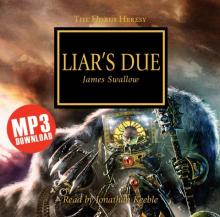 Liar's Due - Ben Swallow
Liar's Due - Ben Swallow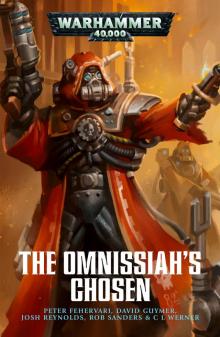 The Omnissiah's Chosen - Peter Fehervari
The Omnissiah's Chosen - Peter Fehervari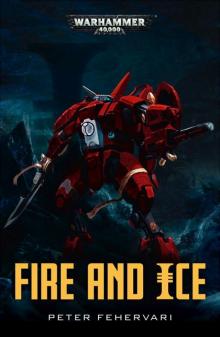 Fire and Ice - Peter Fehervari
Fire and Ice - Peter Fehervari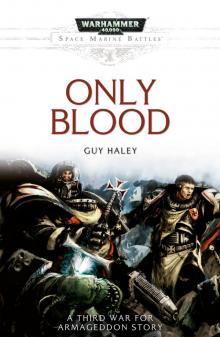 Only Blood - Guy Haley
Only Blood - Guy Haley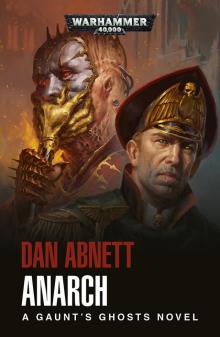 Anarch - Dan Abnett
Anarch - Dan Abnett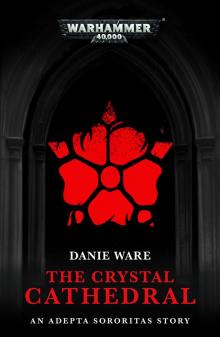 The Crystal Cathedral - Danie Ware
The Crystal Cathedral - Danie Ware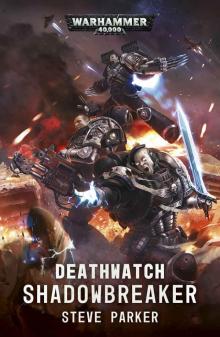 Shadowbreaker
Shadowbreaker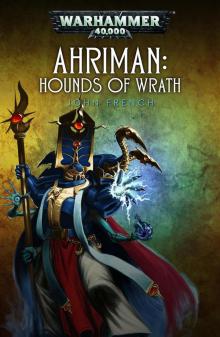 Hounds of Wrath - John French
Hounds of Wrath - John French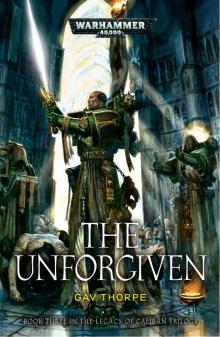 The Unforgiven - Gav Thorpe
The Unforgiven - Gav Thorpe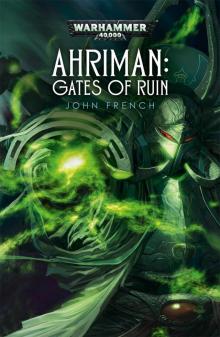 Gates of Ruin - John French
Gates of Ruin - John French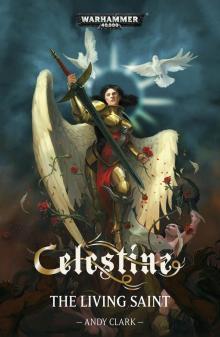 Celestine - Andy Clark
Celestine - Andy Clark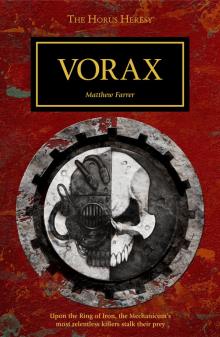 Vorax - Matthew Farrer
Vorax - Matthew Farrer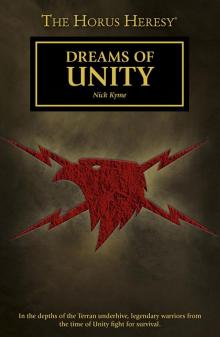 Dreams of Unity - Nick Kyme
Dreams of Unity - Nick Kyme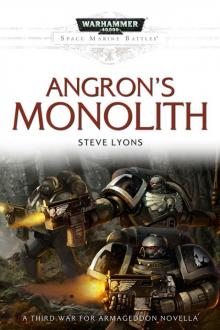 Angron's Monolith - Steve Lyons
Angron's Monolith - Steve Lyons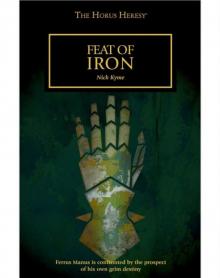 Feat of Iron - Nick Kyme
Feat of Iron - Nick Kyme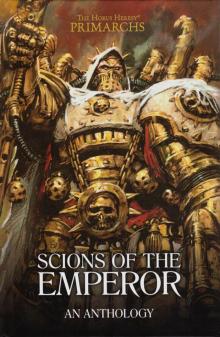 Scions of the Emperor
Scions of the Emperor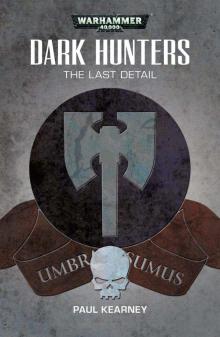 The Last Detail - Paul Kearney
The Last Detail - Paul Kearney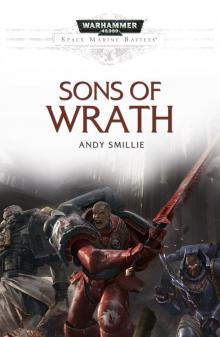 Sons of Wrath - Andy Smillie
Sons of Wrath - Andy Smillie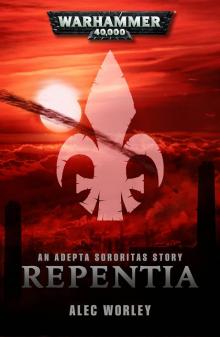 Repentia - Alec Worley
Repentia - Alec Worley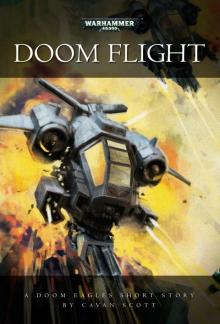 Doom Flight - Cavan Scott
Doom Flight - Cavan Scott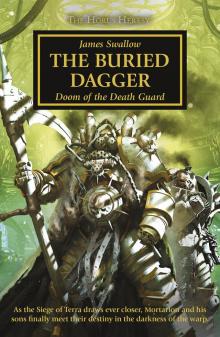 The Buried Dagger - James Swallow
The Buried Dagger - James Swallow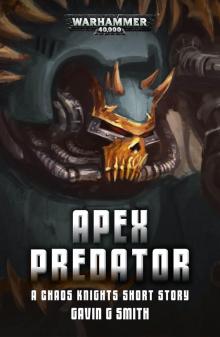 Apex Predator - Gavin G Smith
Apex Predator - Gavin G Smith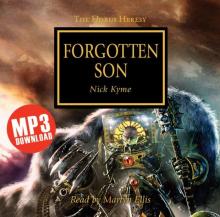 Forgotten Sons - Nick Kyme
Forgotten Sons - Nick Kyme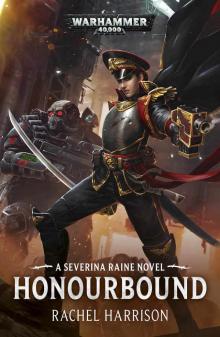 Honourbound - Rachel Harrison
Honourbound - Rachel Harrison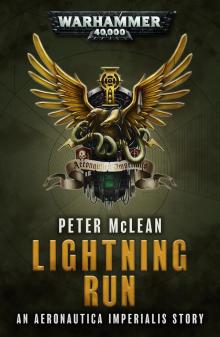 Lightning Run - Peter McLean
Lightning Run - Peter McLean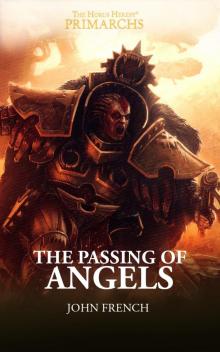 The Passing of Angels - John French
The Passing of Angels - John French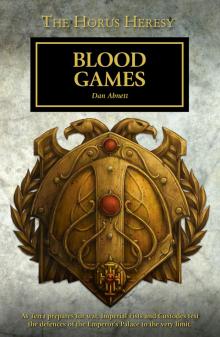 Blood Games - Dan Abnett
Blood Games - Dan Abnett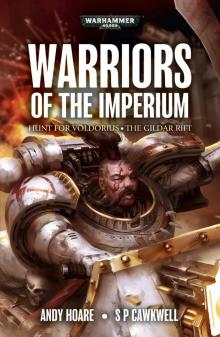 Warriors of the Imperium - Andy Hoare & S P Cawkwell
Warriors of the Imperium - Andy Hoare & S P Cawkwell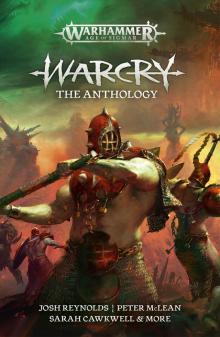 Warcry
Warcry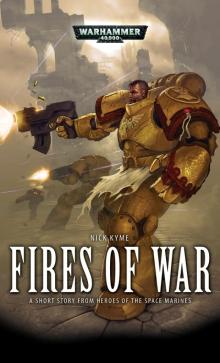 Fires of War - Nick Kyme
Fires of War - Nick Kyme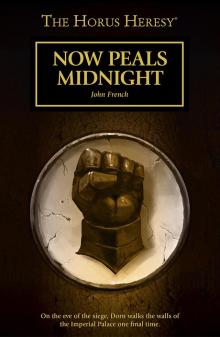 Now Peals Midnight - John French
Now Peals Midnight - John French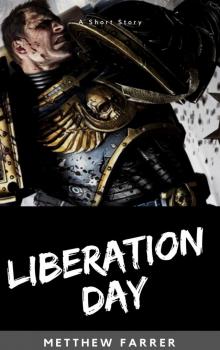 Liberation Day - Matthew Farrer
Liberation Day - Matthew Farrer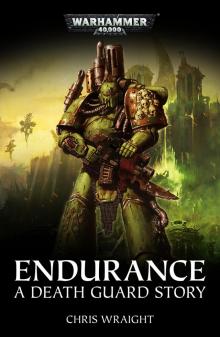 Endurance - Chris Wraight
Endurance - Chris Wraight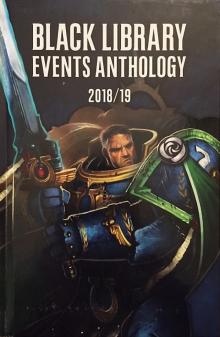 Black Library Events Anthology 2018-19
Black Library Events Anthology 2018-19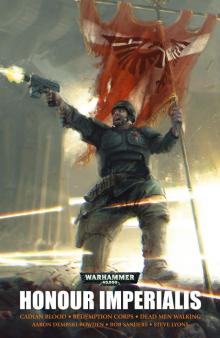 Honour Imperialis - Braden Campbell & Aaron Dembski-Bowden & Chris Dows & Steve Lyons & Rob Sanders
Honour Imperialis - Braden Campbell & Aaron Dembski-Bowden & Chris Dows & Steve Lyons & Rob Sanders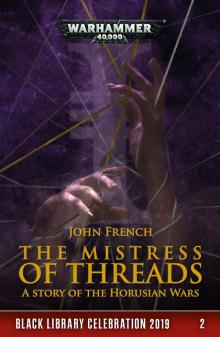 The Mistress of Threads - John French
The Mistress of Threads - John French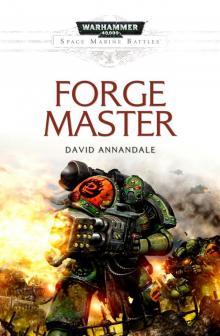 Forge Master - David Annandale
Forge Master - David Annandale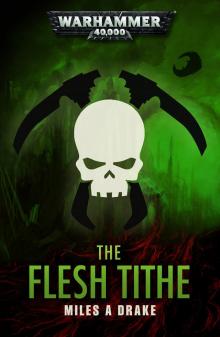 The Flesh Tithe - Miles A Drake
The Flesh Tithe - Miles A Drake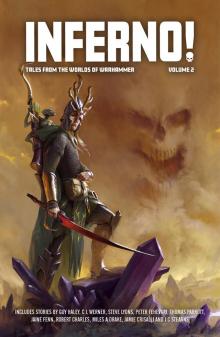 Inferno Volume 2 - Guy Haley
Inferno Volume 2 - Guy Haley Mercy of the Dragon - Nick Kyme
Mercy of the Dragon - Nick Kyme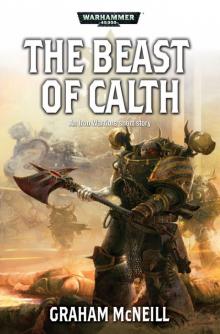 The Beast of Calth - Graham McNeill
The Beast of Calth - Graham McNeill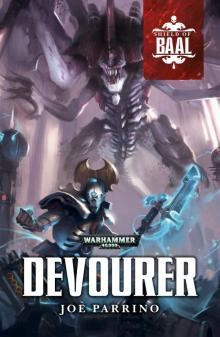 Devourer - Joe Parrino
Devourer - Joe Parrino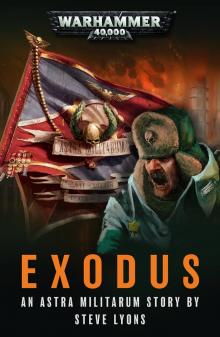 Exodus - Steve Lyons
Exodus - Steve Lyons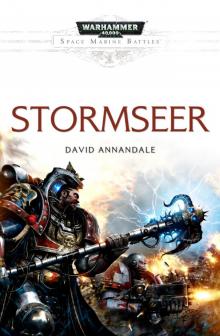 Stormseer - David Annandale
Stormseer - David Annandale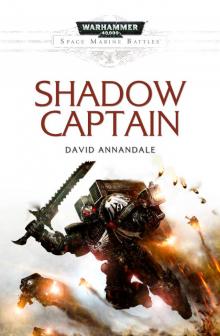 Shadow Captain - David Annandale
Shadow Captain - David Annandale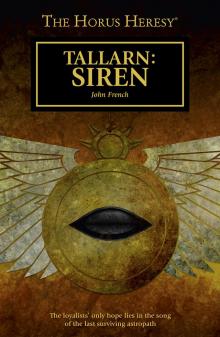 Tallarn- Siren - John French
Tallarn- Siren - John French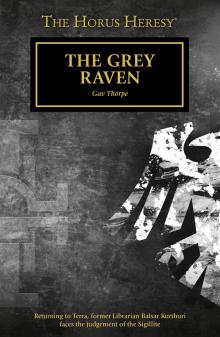 The Grey Raven - Gav Thorpe
The Grey Raven - Gav Thorpe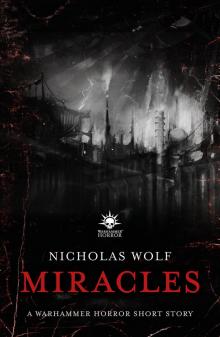 Miracles - Nicholas Wolf
Miracles - Nicholas Wolf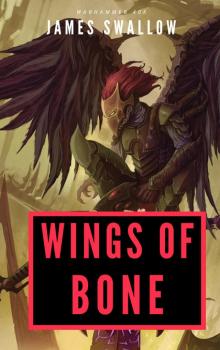 Wings of Bone - James Swallow
Wings of Bone - James Swallow